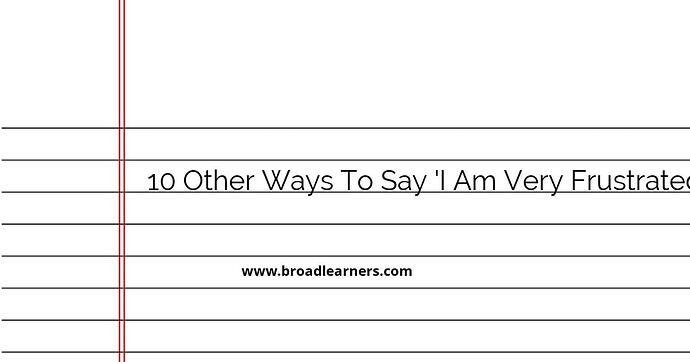Feeling frustrated is a common experience that everyone goes through at some point. However, using the same phrase 'I am very frustrated' can become repetitive and may not effectively convey your emotions. To help you express your frustration with more variety and impact, here are ten alternative ways to say 'I am very frustrated':
- I'm at my wit's end
- I'm extremely irritated
- I'm fed up
- I'm at the end of my rope
- I'm infuriated
- I'm boiling mad
- I'm beside myself with anger
- I'm furious
- I'm seething with frustration
- I'm at the breaking point
Let's explore each alternative in more detail:
1. I'm at my wit's end
This phrase conveys a sense of being completely out of ideas or solutions, which can be a result of ongoing frustration. It suggests that you have exhausted all possible options and feel hopeless.
Example:
I've tried everything to fix this problem, but nothing seems to work. I'm at my wit's end.
2. I'm extremely irritated
When you say you're extremely irritated, you emphasize that your frustration has reached a high level. This phrase suggests that you are annoyed and bothered by a particular situation or person.
Example:
The constant interruptions during my work are making me extremely irritated.
3. I'm fed up
Saying you're fed up indicates that you have reached your limit and can no longer tolerate a certain situation or behavior. It implies that you are tired and exasperated.
Example:
I'm fed up with the lack of communication in this company. It's causing unnecessary delays.
4. I'm at the end of my rope
This expression suggests that you have reached the maximum level of frustration and can't handle the situation any longer. It conveys a sense of exhaustion and desperation.
Example:
The constant changes in project requirements have pushed me to the point where I'm at the end of my rope.
5. I'm infuriated
If you're infuriated, it means you are extremely angry and annoyed. This phrase emphasizes intense anger and frustration.
Example:
The lack of respect for my time and effort is infuriating. I can't continue working like this.
6. I'm boiling mad
When you're boiling mad, it means you are extremely angry and your frustration is reaching its peak. This phrase conveys a sense of intense heat and anger.
Example:
The constant delays and excuses have me boiling mad. This project needs to get back on track.
7. I'm beside myself with anger
Saying that you're beside yourself with anger means that your frustration has overwhelmed you to the point that you feel out of control. It implies a loss of composure and intense emotional turmoil.
Example:
I'm beside myself with anger at the lack of accountability in this team. It's affecting our progress.
8. I'm furious
If you're furious, it means you are extremely angry and your frustration has reached its peak. This word emphasizes intense anger and outrage.
Example:
I'm furious with the constant disregard for deadlines. It's unacceptable.
9. I'm seething with frustration
When you say you're seething with frustration, it suggests that your anger and frustration are simmering just below the surface. It conveys a feeling of intense internal turmoil.
Example:
I'm seething with frustration over the lack of progress in this project. We need to find a solution.
10. I'm at the breaking point
Saying you're at the breaking point means that you have reached your limit and can no longer handle the frustration. It implies a sense of impending collapse or breakdown.
Example:
I'm at the breaking point with the constant changes and lack of support. Something needs to change.
By using these alternative phrases, you can effectively communicate your frustration and convey its intensity. Remember to choose the phrase that best fits the situation and your emotions.
Did I miss anything? Respond below
